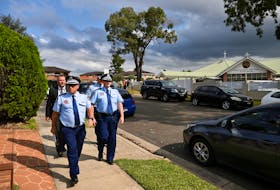Jessica Duffney once tackled the tough job of being a deckhand on a fishing boat off the waters of western Newfoundland.
These days, she’s grappling with an even tougher task as she deals with health issues that have made her fear for her life.
Duffney, 29, is frustrated she cannot get the help she needs or find the answers to her health problems.
When she was 20, the Corner Brook woman began experiencing a rapid heartbeat, along with numbness in her face and arms. She was rushed to hospital, but was sent home after being told she was just having an anxiety attack.
For the next few years, she was back and forth the hospital with similar symptoms. Each time, she was sent home with the same diagnosis of a panic attack.
She said she was even laughed at by health professionals on occasion because she thought her symptoms were signs of something worse.
Eventually, she did develop a form of anxiety borne out of the worry that there was something more sinister going on with her body.
“It got to the point where I got mentally sick,” Duffney said during a recent interview. “I was scared for my life all the time. I literally feared for my life.”
It wasn’t until she was 23 that she finally got to see a cardiologist, who made a diagnosis of supraventricular tachycardia, an abnormally fast heart rhythm caused by unusual electrical activity in the upper section of the heart.
She underwent cardiac ablation therapy, which involves scarring heart tissue to correct abnormal heart rhythms.
While she thought her life would finally go back to normal, it didn’t. Not only did Duffney continue to experience abnormal heart rhythms, they seemed worse.
Further ablations seemed to help, but then she began experiencing new abnormal rhythms, chest pains and other symptoms, such as fainting and extreme fatigue.
She was eventually referred out of the province to a doctor in Halifax, who suspected she had dysautonomia, a disorder characterized by the malfunction of the body’s autonomic nervous system. It can cause a wide range of issues throughout the entire body.
There is nowhere in Atlantic Canada that tests for dysautonomia and the complicated condition is still not fully understood within the medical profession.
Duffney was eventually sent to Hamilton, Ont., where the diagnosis was confirmed.
The specialist she saw in Hamilton has since moved to Calgary to join a team of specialists who focus on dysautonomia specifically.
She then began seeing a doctor in Montreal. The provincial government funded her travel there because it was the nearest centre to her home province where there was a specialist.
There is no cure for dysautonomia, but Duffney visited the Montreal hospital for three years, up until last year, for testing and checkups. She was scheduled for an annual appointment this past August, but could not make the trip after finding out the provincial government was no longer going to provide medical travel assistance for her to go.
She had also hoped to make a trip to Calgary in October to see the doctor she had previously seen in Hamilton. She never requested assistance for this travel because she knew it would be denied, given the location, and she ended up not going anyway because of the cost.
Duffney said she was told her condition could be treated in Newfoundland and Labrador by the cardiologist she had been seeing and a neurologist. However, she said her cardiologist doesn’t know what else to do for her and her neurologist only sees her after she experiences incidents associated with the symptoms caused by her condition.
The doctors in Montreal, she said, want to help her and her supportive family doctor has written both her cardiologist and the government funding decision makers, urging them all to reassess her case and reconsider sending her to Montreal with funding help.
According to provincial regulations, a specialist would have to refer her for any treatment or appointment outside the province, but none will give her that referral.
“These (specialists in Newfoundland and Labrador) take me in and don’t ever keep me as a patient, so I feel let down by them because I have legitimate problems,” she said. “It’s frustrating. The government helped me before, but now they won’t help me get to the people who do want to help me.”
Duffney’s symptoms have progressed to include fainting and nocturnal seizures, along with occasional loss of physical coordination and even the inability to speak properly, among other things. She has injured herself in the past from falls after unexpected fainting spells.
Her condition keeps her from being able to commit to a job because her physical health is not dependable. She volunteers to give herself the sense of worth she feels is missing because she can’t work.
She can’t fly either. The last time she did, she experienced unusually high blood pressure, which was concerning because her blood pressure is typically quite low.
Her previous trips to Montreal for medical appointments have involved being escorted in a car because she can’t drive herself.
Duffney believes there is much more about her condition that needs to known and that it will only be found out by the specialists who are not in her home province.
“I don’t know if Montreal is ever really going to help, but the cardiologist here either can’t or won’t help me,” she said. “I think Calgary would be better, but all I know is here isn’t working. I’ve seen countless doctors and I just keep getting brushed off and I don’t know if they don’t know how to help or what. I don’t ever get a reason from anybody as to why they can’t help me.”
Health and Community Services Minister John Haggie could not comment on the specifics of Duffney’s case, but in an interview said the decision to send someone outside the province is a conversation a patient has to have with the family doctor and specialists involved in their particular case.
“Sometimes, patient’s expectations and physician’s opinions aren’t one and the same … (but) that’s the only way you’re going to resolve who needs what and where to get it,” he said.
He did say there are routes for appealing both the medical opinion of a specialist and decisions on funding travel for medical purposes.
“Once you go down that road, it again is a discussion to be had between the patient and the physician concerned,” said the minister.
Duffney said she has appealed twice and was still denied the assistance she feels she needs to get her life back to some sense of normal.
She said her family doctor has promised to not give up advocating for her and she will be seeing him again early in the new year to see what else can be done to help her.
The only other options available would involve moving closer to one of the centres where specialists who deal with dysautonomia are or seek out costly treatment in the United States.
Neither of those is really feasible, she said, as she can’t afford treatment in America and would not have the family support she avails of at home if she moved elsewhere within Canada.
“We felt like we got halfway ahead when we were dealing with specialists off the island who at least are studying this disease and doing research all the time,” she said. “I just want somebody to help me: a doctor who can take me on and keep me as a patient, so I don’t just keep getting thrown back to my family doctor who is not a specialist. If there is someone out there who can fix my problem, it’s not him.”
What is dysautonomia?
Dysautonomia is an umbrella term used to describe several different medical conditions that cause a malfunction of the Autonomic Nervous System. The Autonomic Nervous System controls the "automatic" functions of the body that we do not consciously think about, such as heart rate, blood pressure, digestion, dilation and constriction of the pupils of the eye, kidney function, and temperature control. People living with various forms of dysautonomia have trouble regulating these systems, which can result in light-headedness, fainting, unstable blood pressure, abnormal heart rates, malnutrition, and in severe cases, death.
Dysautonomia is not rare. Over 70 million people worldwide live with various forms of dysautonomia. People of any age, gender or race can be impacted. There is no cure for any form of dysautonomia at this time, but Dysautonomia International is funding research to develop better treatments, and hopefully someday a cure for each form of dysautonomia. Despite the high prevalence of dysautonomia, most patients take years to get diagnosed due to a lack of awareness amongst the public and within the medical profession.
Source: http://www.dysautonomiainternational.org/









